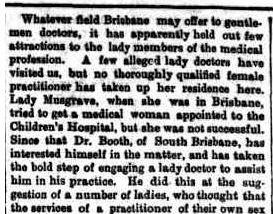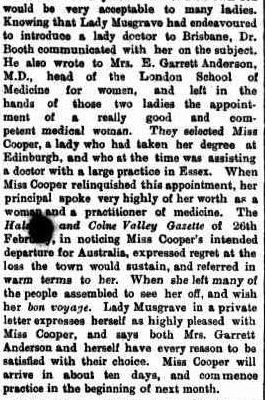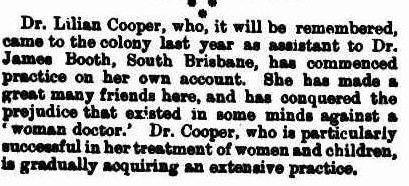Lilian Cooper - the real story
Why the history books are wrong
"Queensland, though doubtless not the most advanced of the colonies, is by no means the least progressive. Our people have generally shown themselves receptive of a new idea, when of a practical sort. ["Women Doctors for Queensland", The Brisbane Courier, 1889]
The quote above is just one of many I've found that change the way we think about Dr Lilian Cooper and her relationship with the people of Brisbane.
I did not set out to prove the history books wrong. I set out to discover what life was really like for Lilian and Josephine. I wanted to go back to primary source material, rather than relying too heavily on secondary source material.
What I discovered made me drastically change the way I thought of Dr Lilian Cooper.
I welcome healthy debate! Please, if anyone has contradictory primary source material, contact me.
False: Dr Lilian Cooper was hired by a drunken Aussie doctor as a joke
In 1891, Lilian Cooper and her partner Josephine Bedford left their home in England and travelled to Brisbane, Australia. Dr Cooper was coming to work in Australia as she had been hired by a male Aussie doctor as his assistant.
Many history books will tell you that the Aussie doctor was a drunk, who hired a lady doctor as a joke. After all, women shouldn't be doctors! What a lark to get a lady doctor from England!
It's a great story, but my research shows it's false.
I tried everything to get to the bottom of this 'drunk doctor' rumour, and I now believe it started with a lecture given by historian Lorraine Cazalar in August 1975 (or at least, that's when I found a reference to it in the papers of the QLD Women's Historical Association).
Lorraine Cazalar, who passed away in 2009, was a celebrated member of the Queensland Women's Historical Association. Her much quoted lecture on Lilian Cooper is entitled "With Courage and Scalpel".
In her lecture, Cazalar states:
"No doubt Lilian didn't expect to be greeted with open arms. After all, she was used to sidelong glances and sneering remarks about her professional status. However, she was confident that her employer would be a buffer against the expected crop of snubs and insults. All too soon it was clear no support would come from him. The man was an alcoholic and had probably written for a female assistant in a mood of alcoholic bravado." [Lorraine Cazalar, 1975]
Unfortunately, Cazalar does not state where she got this information from. Earlier in the lecture she states her sources:
I met people who had worked for her, doctors who had treated her and worked with her, along with grateful ex-patients and their relatives. I corresponded with her niece in Britain who supplied me with many family details and I met a niece of hers who lives in Canberra. I visited places where she had lived and where she had worked. I read a great deal that had been written about her.
These vague sources don't help us much when we try to get to the bottom of many of Cazalar's claims, including the one that Dr Cooper's boss was a drunk who wrote for an assistant in a mood of 'alcoholic bravado'.
As you can see from the quote at the top of this page, the people of Brisbane had been in dialogue about the need for a female doctor for some time. I also discovered this article in the "The Brisbane Courier" in May 1891.

Here we see some strange facts. We discover that Lady Musgrave had already attempted to get a female doctor, and then Dr Booth (the supposed alcoholic!) was successful in securing one for Brisbane. Does that sound like Dr Cooper was hired in a 'fit of alcoholic bravado'? Or does it sound like the people of Brisbane had discussed the need for a female doctor for some time, and Dr Booth helped make this happen?
We also have to wonder where Cazalar received her information that Dr Booth was a drunk. I can't prove that he wasn't, but I CAN prove that he was a humanitarian, who loved animals, fought for better working conditions for labourers, and was a very active member of the Society for the Prevention of Cruelty. If he WAS a drunk, it seems he was a very active and kind one! More about Dr Booth in my article on Mysteries.
The story also goes that after six months with Dr Booth, Lilian found a way out of her contract because she could not longer bear working with him. I can't disprove this, but I spent a lot of time trying to find out if it was quite acceptable for Lilian to stop her assistantship after six months.
What I discovered was that newly graduated doctors, like Lilian, usually had an apprenticeship with an older doctor for a year or so (for example, this article mentions a year-long apprenticeship). In the famous book "The Citadel", the main character of the young doctor only serves an apprenticeship for a limited amount of time. Dr Cooper had already worked with a doctor in England, and had now served 6 months with Dr Booth in Australia, so we might safely assume that Dr Cooper's apprenticeship was simply over. There was no "breaking of contracts" and getting lawyers to "find loopholes" as Cazalar states, but simply the end of a young doctor's apprenticeship. Dr Cooper was ready to go out on her own.
False: Dr Cooper faced a 'wall of prejudice' in the conservative small town of Brisbane
Again, I think this widely accepted falsehood comes from Cazalar. In her lecture, Cazalar states:
"On 4th June, 1891, Lilian became medical practitioner number 489, registered to practise in Queensland. She had taken the first step, but now met with a brick wall of prejudice. Brisbane's male doctors lined up in a solid pack against her. They refused in most cases to even speak to her, but if they did, ignored the title of doctor and addressed her as Miss Cooper. The patients she saw eyed her with suspicion, even the women, who were often more against being treated by a woman then were the men."
Were all the doctors prejudiced against Lilian Cooper?
I believe that some doctors were opposed to Lilian Cooper. However, I do not believe that all the male doctors "lined up in a solid pack against her".
A newspaper article published at Lilian's death reads:
When she began practice In Brisbane about 50 years ago, she met professional antagonism, some of her male colleagues being ready to work with her while others treated her with disdain.
If you read the article in full, it's clear that the writer has received information about Lilian's life from her partner, Josephine Bedford. I can't help but think that Josephine herself was the one who said that 'some' doctors were willing to work with her - providing a far more charitable viewpoint than later historians!
I'm trying to stick to just primary sources, but I now have to turn to the book "No Easy Path" by Lesley Williams, simply because Williams refers to a speech that Josephine Bedford gave to the Queensland Historical Society in 1953. I can't find this speech, so I have to go by Williams indirect quotes from the speech. She says that Miss Bedford:
"believed their (the doctors) hostility did not come from jealousy but from a very deep-rooted conviction that a woman's place was in the home...She said that one particular expression much used at the time was that a woman became "unsexed" if she followed a man's profession. No-one, not even those who used the sentence could explain its meaning."
I'd love to get my hands on this speech to find out more of the context. It doesn't help me prove, or disprove, whether they entire medical profession were prejudiced against her. And not just prejudiced! Some history books say she was 'boycotted'. Much is made of the fact that Dr Cooper's application to join the Queensland Medical Society in 1892 was denied. When she replied in 1893, there was some debate about whether to allow her membership. However, Dr David Hardie proposed her admission. His motion was supported and carried, revealing that there were other doctors who also supported her. We know also that Dr Booth was supportive of her, at the very least in the year 1891.
So the only year in question is 1892 - was she boycotted in that year?
I would love to find some evidence that she was 'boycotted' in 1892, so please do contact me if you have some. Until then, I'm just not ready to believe that Brisbane doctors, one and all, lined up in a pack against her. The Brisbane medical community loved to argue - these were men with strong ideas and - often - ideals. To organise them into a boycott would be like trying to herd cats.
Were the people of Brisbane prejudiced against Lilian Cooper?
I can prove that Lilian Cooper had heaps of friends in Brisbane,
Already, we've seen in the quotes above that there was an articulated desire for a female doctor in Brisbane. In fact, members of the upper echelon of society had already attempted to secure a lady doctor, showing that there was no resistance to the idea among the 'movers and shakers' in Brisbane. After so much discussion about wanting a lady doctor, are we really to believe that the women of Brisbane suddenly turned their backs on her?
If you take a look at my page entitled 1891, you'll also see just how social Lilian Cooper was during her first year in Australia. She went to the most elegant parties, took part in amateur theatre and much more. She was also the preferred doctor to Amy Coventry, one of Brisbane's most prolific journalists, which I believe helped to increase her social standing (more about that in my article 'Mysteries').
By her second year in Brisbane, Dr Cooper was a popular lecturer at various events, like this one, which was covered in glowing terms:
The attendance at Monday's meeting of the South Brisbane Literary and Debating Society was an unusually large one, the special attraction being the presence of Dr. Lilian Cooper...[The Brisbane Courier, 1892]
Again, I'm not saying that there wasn't any prejudice. But the truth is far more 'grey' than most history books make out. This is articulated in this reference to Dr Lilian Cooper in a Sydney newspaper in January 1892, just six short months after she became a registered doctor.
It suggests that she has already 'conquered prejudice' and is building an 'extensive practice'.
So the truth, it seems, is more complicated than the fiction we find in the history books. Dr Cooper did not find herself in a cold, cruel Brisbane that shut her out and pushed her down. Instead, she was a welcome addition to the town, who quickly acquired friends and patients.
I put forward this argument quite willing to be proven wrong. If anyone has anything they'd like to add, please do contact me!
And note that I'm not suggesting that Lilian's life would have been entirely rosy! I've also compiled hilarious articles from the time that show the ridiculous attitudes Lilian would have had to face. Check out my article on Mannish women and bachelor girls.


![Dr Lilian Cooper [From the John Oxley Libary]](http://qwertygirls.com/wp-content/uploads/2013/08/Doctor-Lilian-Cooper.jpg)

![Lady Musgrave wanted a female doctor for Brisbane. [Photo: John Oxley Library]](http://qwertygirls.com/wp-content/uploads/2013/08/Lady-Musgrave.jpg)


